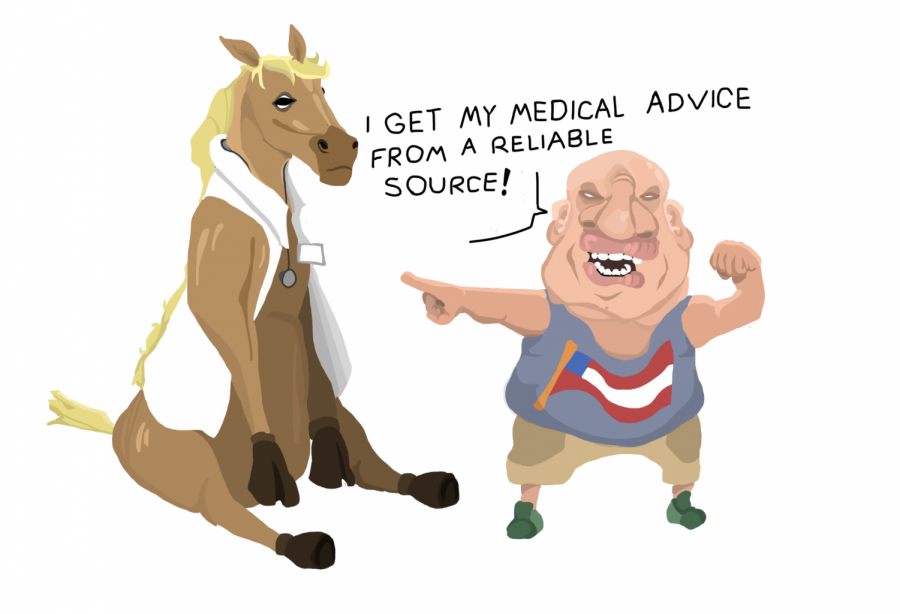Vaccine skeptics horse around with equine medication
Anti-vaxxers in the US have turned to Ivermectin, a drug meant for horses. as an alleged replacement for the vaccine.
As the distribution of COVID-19 vaccines continues throughout the world, so does the prevalence of anti-vaxxers, the title taken up by those unwilling to receive any version of the immunization.
“It was never about health,” one of many messages (this one authored by Henry Nicholls) paraded around by anti-vaxx protesters through both marches and social media platforms said. “It was about control.”
Such ideals have led to the popularization of alternative medication to treat the symptoms of the coronavirus. Ranging from multivitamins to (at the request of the previous American president) drinking bleach, alternatives to the needle jab have varied significantly. With that in mind, a new alternative has appeared up for praise by this small but vocal crowd: ivermectin, a horse deworming medication.
The drug was discovered in 1975 by William Campbell and Satoshi Ōmura, marketed in 1981 as a treatment for parasitic infestations. It can treat both human and animal parasites alike but has seen primary use in veterinary practices until recently, when the aforementioned group flipped it on its head. An Ivermectin shortage is ongoing across the United States while misguided people around the nation are buying it up like a miracle cure, and many are asking, “why?”
There was no grand breakthrough that sparked it, nor some government conspiracy unearthed that would change medicine forever. Rather, it was because of a podcast made by a man by celebrity Joe Rogan. Rogan’s podcast covers various news topics, bringing on different personalities to discuss them.
On July 22, in the midst of an ongoing pandemic, Rogan brought on Dr. Pierre Kory to discuss the pandemic as a whole. Kory discussed the benefits of a rather unknown medication by the name of Ivermectin.
“It will all be needless death from here on out, given that there is a readily available scientific solution to the pandemic,” Kory said.
It was proposed as a miracle cure, and vaccine skeptics and alarmists alike ate it up.
This was a medication allegedly not tampered with by “big pharma” (a term reserved for the major group of multinational pharmaceutical companies), and one that could single-handedly end spread of the virus without a single shot; neither of those statements was true.
“The use of Ivermectin to prevent and treat COVID-19 in humans has yielded insufficient evidence… to recommend its use,” the CDC said in an official statement released in August.
Several research trials by other organizations have supported the CDC’s conclusion, yet advocates for the drug continued to pop up in volume and voice around the internet. One example includes a right-wing cartoonist Ben Garrison creating a piece mocking both the vaccine and Chief Medical Advisor Dr. Anthony Fauci, having the pair getting the boot from the hooves of a horse as it cries, “Get Some Horse Sense!” One would think such confidence would correlate with newfound success, but rather the National Poison Data System has reported some disturbing consequences — over 1,100 confirmed cases of Ivermectin poisonings.
When taking a medication meant for 1,200-pound animals, proper dosage for humans is nebulous at best. This was a fact not considered by many hoping to try out this new fangled “miracle cure.” The weeks following the initial boost in popularity saw a 245 percent increase in poison cases across the nation. This statistic coincided nicely with increased countrywide use of the dewormer.
“3,600 prescriptions per week at the pre-pandemic baseline…to a peak of 39,000 prescriptions,” a statement by the CDC said.
This has led many to consider the power and dangers of the world wide web, such as widespread misinformation, during an ongoing crisis in which hospitals are filled to the brim with preventable illness.
“It is par for the course — easy access to the internet has made many into self-proclaimed experts, ignoring officials and jumping to new conclusions,” Columbia Heights science teacher Ms. Aimee Candella said.
With this in mind, it’s important to be cautious about what you put out into the world. Is it true or just a rumor? Will it harm anyone? These are steps toward a society built not around trust but truth, or we might try and take medication fit for the horse.
As the pandemic continues to unravel it is important to stay informed. In an era of information at our fingertips, one should make sure they are basing their decisions with the help of qualified officials with quantified results rather than the self-proclaimed geniuses of the internet.

Simon Graves is a senior and a Staff Writer and Illustrator for The Heights Herald. He is a part of the NHS, Key Club, Pep Band, and an avid member of...







